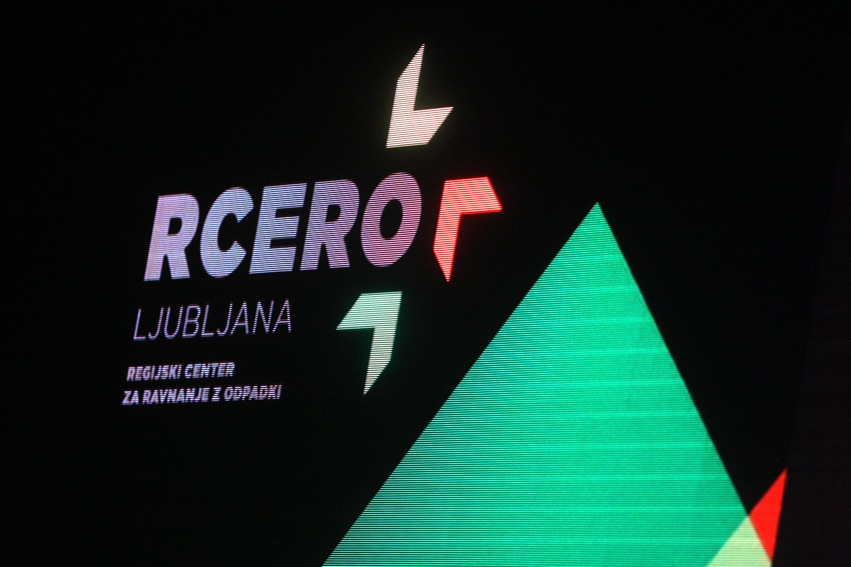Upgrade of RCERO Ljubljana
The upgrade of the regional waste management centre (RCERO Ljubljana) is the biggest cohesion project in the field of environment in the country.
The project encompasses 37 municipalities, and for this reason the regional centre is a unique example of good practices in relation to integration and cooperation of municipalities as well as a connecting element in the field of waste management treatment in Slovenia.
In one of the largest centres of its kind in Europe waste from approximately one third of Slovenian residents will be processed in the facilities for mechanical biological waste treatment equipped with state-of-the-art and sustainable technology.
We are proud because Ljubljana recorded the highest share of separately collected waste among European capitals (in 2014 we recycled 63 percent of waste) and Ljubljana is also the first European capital to embark on the path towards a Zero Waste society.
This is also one of the reasons we have been awarded the prestigious title European Green Capital 2016 and made an important step towards further economic and social development.
With the start of operation of Ljubljana’s regional centre we will be more efficient in fulfilling the commitment in which we strongly believe. The commitment common to all cities, regions and EU members: to manage natural resources sustainably and to contribute towards the transition into a circular economy.
The project RCERO Ljubljana Upgrade is comprised of three subprojects, namely, the expansion of the landfill, leachate treatment plant and waste recovery facilities. The new landfill (3rd phase of the IV. and V. landfill cells) has been in use since 2009, the leachate treatment plant has been in operation since January 2011, and the construction of the waste recovery facilities, which is the most demanding part of the project, has begun in 2014.
The contract of accession of the municipalities of the wider Ljubljana region to co-financing of the RCERO Ljubljana Upgrade was signed at the end of 2009 by seventeen municipalities in the Central Slovenia region. These are, in addition to the City of Ljubljana, peri-urban municipalities, which are co owners of the Public Holding Ljubljana – Medvode, Brezovica, Dobrova Polhov Gradec, Škofljica, Dol pri Ljubljani and Horjul – and other acceding municipalities – Ig, Velike Lašče, Domžale, Kamnik, Mengeš, Komenda, Trzin, Lukovica, Moravče and Vodice. The main project investor is the City of Ljubljana while other municipalities are co-investors.
Up to June 2014, additional nineteen municipalities joined the project RCERO Ljubljana, and so there are now 37 municipalities incorporated in the project RCERO Ljubljana. In addition to the above mentioned, these are Grosuplje, Ivančna gorica, Dobrepolje, Ribnica, Loški Potok, Sodražica, Cerklje na Gorenjskem, Bloke, Žiri, Gorenja vas Poljane, Koper, Šmartno pri Litiji, Vrhnika, Borovnica, Log Dragomer, Idrija, Postojna, Pivka, Cerkno and Ankaran.
The estimated total value of eligible costs for the RCERO Ljubljana Upgrade is 127,048,772 euro (excluding VAT). The funding application submitted to the EU Cohesion Fund had been in the process of coordination from September 2006 until April 2009 when the European Commission adopted the decision on co-financing for the project in the value of 77.6 million euro (65.88 percent) from the EU Cohesion Fund. The rest of the funds come from the state and municipal budgets and the environmental tax for environmental pollution caused by waste disposal.
FACILITIES FOR MECHANICAL- BIOLOGICAL WASTE TREATMENT
Within the framework of RCERO Ljubljana mechanical biological waste treatment will be performed, and two types of waste will be treated: separately collected biological waste and the rest of the mixed municipal waste. Bulky waste will also be taken in and sorted. The aims of the mechanical biological waste treatment are to reduce the quantity of waste going to the landfill and to separate fractions which can be recycled or thermally treated (burnt in a dedicated incineration plant) – for instance, metal and glass, and production of compost from biological waste. Waste treatment will be carried out as a three-part technological process.
The first stage consists of the mechanical separation of mixed municipal waste and the preparation of solid fuel, the second stage is the anaerobic digestion of the biodegradable fraction extracted from mixed municipal waste with biogas production and the third stage is the fermentation of separately collected biological waste with biogas production. Within the scope of mechanical biological waste treatment in the RCERO Ljubljana facilities we will annually produce approximately 60,000 tons of solid waste from waste of different calorific values, 35,000 tons of digestate following the anaerobic treatment of the heavy fraction of mixed municipal waste, 6,000 tons of wood, 7,000 tons of compost following the treatment of separately collected organic biodegradable waste, 25,000 tons of sorted secondary raw materials, 17,000 MWh of electric energy and 36,000 MWh of heat energy from biogas produced in the process.
ADVANTAGES OF THE PROJECT RCERO LJUBLJANA UPGRADE
- Long-term solution of the waste management issue for one third of Slovenia, that is 700,000 residents;
- the best and the most contemporary waste management system in Slovenia;
- using the most advanced and sustainable technology for waste management on a European scale;
- production of green electrical energy from a renewable source, biogas;
- production of electrical and heat energy to be used directly in the facility;
- after the treatment only some 20 percent of waste will end up in the landfill, as it will be unsuitable for reuse as raw materials or energy products, but without having adverse impacts on the environment;
- biological waste will be processed into convenient compost to be used for gardening and landfill maintenance;
- green jobs;
- production of secondary fuel from the light fraction of the mixed municipal waste;
- an example of good practice in relation to integration and cooperation of municipalities as well as a connecting element in the field of waste management treatment in Slovenia between municipalities and regions.


